- Home
- Salman Rushdie
Quichotte Page 12
Quichotte Read online
Page 12
“Oh, that’s right, money,” the young fellow said, snapping his fingers. “Can I get a bank account? That’s important. A debit card is important. An overdraft is important. If you’re not buying stuff, if you’re not making repayments, the system doesn’t recognize that you exist.”
“You must be patient,” Quichotte said to his son. “All in good time. At present I am a man on a great quest and that has priority, as I am certain you can understand.”
“In your dreams,” the youth said, impolitely. “What quest? As far as I can see, you haven’t even made a start.”
“On the contrary,” Quichotte answered him. “I am in the first valley, through which any seeker must pass.”
After breakfast, on a trestle table in the picnic area, Quichotte rolled out a large map of the continental United States. Birds wheeled in the sky overhead: a pair of ospreys with six-foot wingspans, from the osprey nest on a pole in the heart of the Lake Capote campsite. “The hawk is a great hunter,” Quichotte said. “Fish quail before its shadow. It is good to have them here. They grace our pursuit. Their presence is a blessing.”
“What are you looking for?” Sancho asked, jerking a thumb in the direction of the map. “Outlet stores?”
“According to one of the great classic descriptions of the quest,” Quichotte said, “the seeker must pass through seven valleys.”
“What TV show are you talking about now?”
“This is not a TV show,” Quichotte said. “This is old. From before there was TV.”
“Awesome,” Sancho said. The concept of a time before television impressed even his sarcastic self. That had to be a really long time ago. “Where are these valleys located, anyway?” he wanted to know. “San Fernando Valley where the Valley girls live? And the vampires, moving west down Ventura Boulevard? Or maybe Sun Valley? Death Valley? Happy Valley? Valley Forge? That’s all the valleys I’ve got.”
“It doesn’t have to be an actual valley,” Quichotte explained. “The valley is a metaphor. The seven valleys can be anyplace, anywhere.”
“Then why,” the youth asked, not unreasonably, “are we looking for them on a map?”
“Every quest,” Quichotte answered, “takes place both in the sphere of the actual, which is what maps reveal to us, and in the sphere of the symbolic, for which the only maps are the unseen ones in our heads. Still, the actual is also the road to the Grail. We may be after a celestial goal, but we still have to travel along the interstate.”
“You lost me there,” Sancho shook his head. “But that’s okay.”
“The first valley is the valley of the quest itself,” Quichotte said. “Here the searcher has to cast aside every kind of dogma, including both belief and unbelief. Old age itself is such a valley. In old age one becomes detached from the dominant ideas of one’s time. The present, with its arguments, its quarreling ideas, is revealed as fleeting and unreal. The past is long gone and the future, one recognizes, is not a place in which one will find a foothold. To be separated from the present, past, and future is to entertain the eternal, to allow the eternal to enter one’s being.”
“But if you cast aside unbelief as well as belief”—Sancho scratched his head—“then there’s nothing left. Right? All you’ve got is an empty head. That can’t be good? Can it?”
“Systems of thought will not help us on our journey,” Quichotte answered. “Systems of thought, and their antitheses as well, are merely codifications of what we think we know. When we begin by abandoning them, we open ourselves to the immensity of the universe, and therefore also to immense possibilities, including the possibility of the impossible, in which category I place my quest for love.”
“Sounds like one of those shows where you get marooned on an island and your city-slicker knowledge can’t help you. Wrecked, Marooned, Man vs. Wild, Dude You’re Screwed. Or is it more like The Quest or Galaxy Quest?”
“We will see,” Quichotte told him.
“Anyhow, that’s right about the universe, I get that part,” Sancho said. “The universe doesn’t have positions or theories or rebuttals or any of that. The universe is just up there, out there, all around, and it doesn’t give a fuck.”
“And now we too must seek to be just there,” Quichotte replied.
“And not give a fuck?”
“There is no need to give a fuck,” Quichotte answered gravely, “about anything except the goal of our journey.”
“Namely the lady.”
“Exactly. All else is vanity and must fall away.”
“Cool,” Sancho said. “I can focus on the lady too. That’s no problem at all.”
“I will write to her,” Quichotte declared. “I will say, I am in the first valley of the quest, and am casting aside all dogma, no longer believing anything nor disbelieving. Consequently I am becoming open to the possibility of the impossible, in which category…”
“Yes, yes,” Sancho said. “There’s no need to say everything twice.”
“I will say, I am a sleepwalker, walking as if through a dream, until I awake into the reality of our love. It will be a magnificent letter,” Quichotte said, “and will do much good work on my behalf.”
“I guess,” Sancho replied. “Sounds kind of off-putting to me.”
“You know nothing,” Quichotte reproved him. “Until an hour ago you were just a figment of my fancy. I don’t think your opinion carries much weight at present.”
“Whatever you say,” Sancho shrugged. “Right now, in my life, you’re the one holding all the important cards.”
At that exact moment, an osprey flying directly overhead sent them a communication. The communication landed splat on the map of the United States and obscured the city of New York; after which the osprey, having nothing further to communicate, had completed its role in our story and flew away.
“Ugh,” expostulated Sancho. “Fucking bird.”
But Quichotte was clapping his hands. “This is it!” he cried.
“This is what?”
“The sign. The hunter has guided us, and the hunt is on! We must go immediately where we have been told to go.”
“This is the sign?” Sancho demanded with some indignation. “My transformation from a figment into a flesh-and-blood person, that’s not the sign? Birdshit is the sign?”
“On the road to New York we will find the second valley, and, I now believe, all the others as well,” Quichotte told him. “In the concrete canyons, where the Beloved awaits me.”
“I could have told you that without the help of some crappy bird,” Sancho said. “And what’s the second valley, anyway?”
“The second valley,” Quichotte solemnly pronounced, “is the Valley of Love.”
The second letter from Quichotte unexpectedly touched the heart of Salma R—or even Salma—we have gotten to know her well enough by now to drop the formality of “Miss.” I am a sleepwalker, walking as if through a dream, until I awake into the reality of our love, it began, and continued through several pages of increasingly purple expressions of adoration. And again, at the end, the oddly ungrammatical sign-off, a peculiarity at the end of a linguistically competent, if overly baroque, piece of writing. Sent by a smile, Quichotte. “I’m still worried about him,” she told her security chief, “because it goes without saying that stalkers, like groupies, are one hundred percent always and absolutely out of their minds. But the man has a turn of phrase.” And the metaphysical aspect of the letter, the surrender of all vestiges of belief, but also of the processes of un- or disbelief, so that one might simply face reality with an open heart and receive its messages, was not without interest.
She made a copy of the letter and read it in the Maybach on the way home, too many times. Her driver asked, just to have some fun with her, “Miss Daisy, is that the light of love in your eyes?”
She snorted at him. “Hoke, just drive the c
ar. There are driverless limos now, don’t forget.”
“Yes, Miss Daisy,” the driver said, and hummed under his breath, “But will you still love him tomorrow?”
It may be that one reason why Salma responded as emotionally as she did to the second letter from Quichotte is that she was herself all too familiar with the battle against mental illness, being a third-generation sufferer herself. For a long time after the family plague manifested itself in her, it was strong medication that kept her going, so much so that she made up a rhyme about it, and even recited the rhyme on her show, where she was open about the ecstatic disorder of her brain. “It’s lithium and Haldol and Haldol and lithium,” she chanted in front of her laughing studio audience, and then got them all to sing along. “Can’t do without those pals, doll, and so I just live withium.” She had had to get used to the word bipolarity, because both her mother and grandmother had called it manic depression and so manic depression felt like the right term for what she had inherited from them, the dangerous darkness sitting every day and every night in the corner of one eye and the blinding brightness in the corner of the other one. The meds had controlled the monster within, just about, but there were bad moments, such as when, during a trip to San Francisco, the elevated mood, the hypomania, seized hold of her and she started running around town buying a slew of expensive artworks—an ancient wooden mask from Cameroon, a set of rare pornographic ukiyo-e drawings from Japan, and a small late Cézanne—which her young assistant, also occasionally her lover, had to return to the galleries later that evening, after explaining her condition to them delicately when she wasn’t listening. After this episode her attending health professionals had expressed concern that her condition might be becoming treatment-resistant, and suggested the possibility of electroconvulsive therapy: ECT.
“Shock treatment? You want me to have therapy by voltage?” she demanded. “But my dears, don’t you know by now that I’m unshockable?”
Nevertheless, she acquiesced. She had to come off the lithium, the health professionals said, because it could be toxic in combination with the juice. (“Well, that ruins a good song,” she told them.) When she awoke from the first treatment her first words were, “So, that felt exceptionally good. And I suppose I should have asked this before, but are there any side effects I should worry about?”
“You may experience some temporary confusion,” her senior health professional replied.
“Darling,” she said, “how will anyone be able to tell the difference?”
“And there may be some temporary, or in some cases permanent, memory loss.”
“Ah,” she said. “So I suppose I should have asked this before, but are there any side effects I should worry about?”
* * *
—
SHE HAD TO BE “on” from the moment she walked into the studio until the moment she sank into the car with her dirty martini (up, with olives), and she got through it perfectly every day. Well, most days. There was a Latina woman, a rival who wanted her job, who “sat in” for her on the few occasions when her condition did not allow her to appear. She did not care to recall this woman’s name. She had also forgotten the driver’s real name. She called him Hoke after the character Hoke Colburn because he might as well have been Morgan Freeman in that movie, he looked and sounded so damn much like him. He saw the moments of collapse and said nothing, not so much because of admiration or loyalty as because to say something would have meant he’d be out on his ear and never get a dime from Miss Daisy again. The most daring thing he had ever said to her was this: “There’s sure a lot of different folks in there inside your skin, Miss Daisy. I reckon I’ve seen twenty or thirty of them and I’m not positive I’ve seen them all.” She hadn’t liked that. After that he kept most of his opinions to himself.
On the roof of the old chocolate factory on Lafayette Street there was a high-ceilinged modern penthouse, which could have housed a substantial family, in which Miss Salma R lived alone. The word alone, in this context, should be understood to mean “plus hair and makeup, plus personal assistants (three, including the aforementioned casual lover, a white boy named Anderson Thayer who claimed descent from a Mayflower pilgrim and who was at least a dozen years younger than Salma, a smallish man with long red hair and a Zapata mustache who reminded her at times of Rumpelstiltskin from the Brothers Grimm and at other times of Yosemite Sam from Looney Tunes), personal publicists (three, two for the U.S., one for India), and security (two, one outside the penthouse door and one inside it, plus one more in the lobby downstairs).” At night this number dropped to two: one assistant in a spare bedroom on call to help with nightmares or other forms of nocturnal anguish (this was a female assistant—definitely not Anderson Thayer, with whom Salma’s occasional liaisons were carried out discreetly, away from the eyes of other members of her staff), one security guard (also female) to cope with all other issues. To Salma herself, however, the word alone meant “without a serious man in her life.” She was grateful (mostly grateful) for Anderson Thayer, who was attentive to her when she was down and managed situations well when she was in the grip of her over-bright upswings, but she thought she might have to fire him soon, because he was getting to be a little too bossy, a little too controlling, for her liking. She would have to fire him from her bed as well, obviously, and then “alone” would become even more alone.
We have not, thus far, explored Salma R’s private life in New York City, her dark side, out of respect for her privacy. However, the privacy rights of fictional characters are questionable—to be frank, they are nonexistent—and so we hereby abandon our modesty to reveal that she had had not one but two brief, unsuccessful marriages, the first to a Los Angeles über-agent who left her for a handsome young man, and of whom she always thereafter said that she had turned him gay, the second to a Manhattan-based writer-director whom she left because, she said, “their neuroses were incompatible,” and then she added, “Every female character he ever wrote was me, including all the ones he wrote before we met, and they all left him.” As she said these things in more or less exactly these words on many nationally syndicated television talk shows, including her own, we are not probing very deeply into her personal matters by revealing them.
Beneath the comedy, however, there was sadness, and acute self-doubt. She was proud of being her mother’s daughter and her grandmother’s granddaughter but in spite of all her success found it impossible to feel like their fully fledged inheritor, their peer. This sense of her inferiority may well have been the unstated determining factor in her decision to leave the Indian film industry and reinvent herself in America, where the cruel generational comparisons would not be made, or not nearly so often, and where she herself could escape her own inner voice telling her, you’re just not as good as them. On the whole she preferred her American self, though the past still pulled at her. And then there was the bipolarity, her true inheritance, uniting the three women across time and space.
For all this, there were the proper drugs, and the ECT as well. And for happiness, there was—there had been for a long time, before America, before the black bird of the family condition had landed on her shoulder—kickers. Cotton. OC. Orange County. OxyContin.
Back home it had been easy to get the supplies but even in America there was always a doctor who would bend the rules for a star. She was told she was living dangerously, playing with fire, but the scripts for the time-release drug were written for her nevertheless. To add recreational opioids to the meds she was taking for her mental health was extremely ill-advised, she was advised, but the scripts went on being written. Words like life-threatening, respiratory arrest, and death were used, but the scripts were still written and the pharmacies handed out the painkillers, no problem.
As a cursory glance at the contents of her bathroom cabinet would reveal even to the untutored layperson, Miss Salma R was almost as expert in pharmaceuticals as her compliant pharmacist, so she kn
ew about the dangers of misuse. Crushing, chewing, snorting, or injecting the dissolved product will result in the uncontrolled delivery of oxycodone and can result in overdose and death. She knew that. But oh dear she did misuse it. She did not inject the dissolved product, because she was squeamish about needles, plus the tracks would be bad for business. But the uncontrolled delivery of oxycodone was exactly what she wanted. So, regrettably, she crushed, she chewed! Sometimes, it’s true, she even snorted! How shocked, how disappointed in her her legion of admirers would have been! Or not, of course. As we have noted, she was explicit about many of her vulnerabilities. Not this one; but maybe her fans would just have added it to the list and loved her even more. At any rate, very few people knew about her habit. Rumpelstiltskin knew. Yosemite Sam knew. Another reason to fire him, though he might try to blackmail her. He would be unwise to try that. She was a powerful woman. He would know it was unwise to try that.
He did try, in his newly controlling way, to stop her. She shrugged off his advice. “I’ve been doing this for so long,” she said, “I’m an expert in self-medication.” When she said this he had tossed his long red hair. She had never seen a man toss his hair, so this got her attention.
“Whenever somebody says that,” he told her, as his hair subsided in slow-motion as if he were in a L’Oréal commercial, “I think, there are a lot of dead experts in self-medication. I think, Heath Ledger.”
“Toss your hair again,” she said. “How do you manage to do that slow-motion thing?”
He gave up and grinned. “Because I’m worth it,” he said.
If we must get into the dark details, for some while now it hadn’t actually been OxyContin itself. There had been a change in the formula which made it harder to use. When she tried to crush the new OxyContin OP tablets, they resisted, becoming a gummy mess that was hard to chew and impossible to snort. She tried burning them in her microwave. She tried soaking them in acetone, baking them, freezing them. It was frustrating. She had turned to Perc30s and Roxies, which were thirty milligrams each of pure oxycodone (you could get OxyContin tablets containing up to eighty milligrams, so she needed larger quantities of these lower-dosage painkillers). Lately there had also been Opana and other, similar versions of oxymorphone. As she said, she had become an expert. None of the replacements were as satisfying as the old Oxys. Why did the world have to change? She needed to find a new solution. There were people who had been driven to heroin by the change in the Oxy tablets, but heroin scared her. The word “heroin” scared her. She wouldn’t go there. The things she had now were workable, they would do, but the old stuff was the best. Take me away, she thought when she was alone in her bed at night and the painkillers were easing her spirit’s pain, to those old Cotton fields back home.

 Shame
Shame The Enchantress of Florence
The Enchantress of Florence Imaginary Homelands: Essays and Criticism 1981-1991
Imaginary Homelands: Essays and Criticism 1981-1991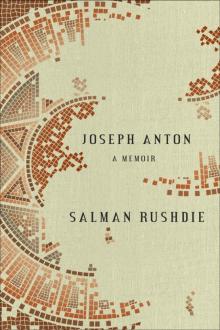 Joseph Anton: A Memoir
Joseph Anton: A Memoir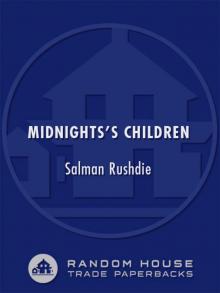 Midnight's Children
Midnight's Children East, West: Stories
East, West: Stories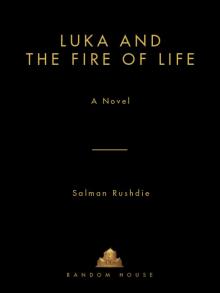 Luka and the Fire of Life
Luka and the Fire of Life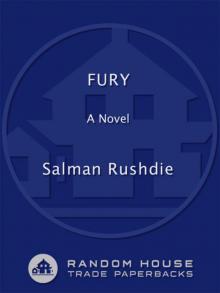 Fury Fury Fury
Fury Fury Fury Haroun and the Sea of Stories
Haroun and the Sea of Stories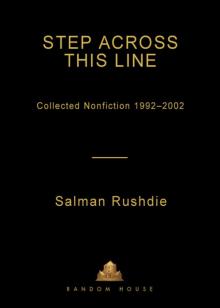 Step Across This Line: Collected Nonfiction 1992-2002
Step Across This Line: Collected Nonfiction 1992-2002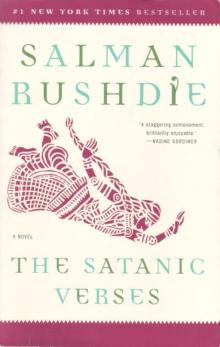 The Satanic Verses
The Satanic Verses The Moor's Last Sigh
The Moor's Last Sigh The Prophet's Hair
The Prophet's Hair The Ground Beneath Her Feet
The Ground Beneath Her Feet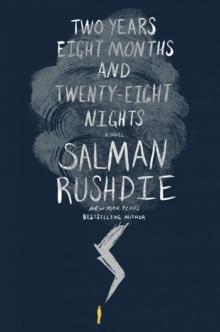 Two Years Eight Months and Twenty-Eight Nights
Two Years Eight Months and Twenty-Eight Nights Shalimar the Clown
Shalimar the Clown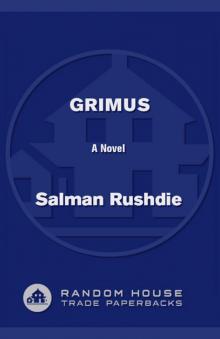 Grimus
Grimus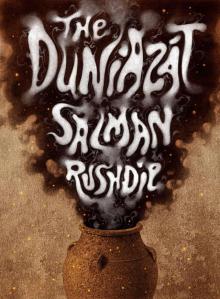 The Duniazát
The Duniazát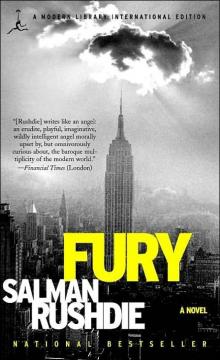 Fury
Fury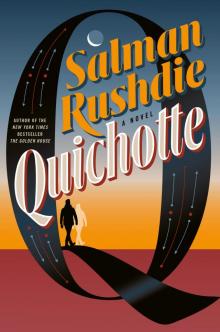 Quichotte
Quichotte The Jaguar Smile
The Jaguar Smile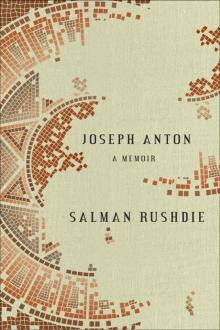 Joseph Anton
Joseph Anton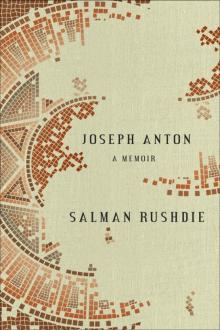 Joseph Anton: A Memoir: A Memoir
Joseph Anton: A Memoir: A Memoir Imaginary Homelands
Imaginary Homelands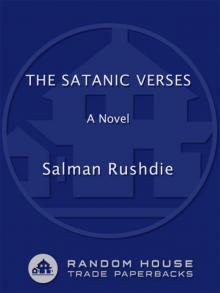 The Satanic Verses: A Novel
The Satanic Verses: A Novel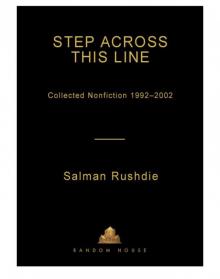 Step Across This Line
Step Across This Line East, West
East, West